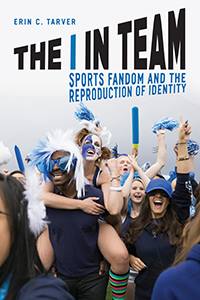With the start of college and professional football upon us, the mania of American sports fandom will be on full display. Assistant Professor of Philosophy Erin Tarver's new book looks at the deeper side of what's going on.
A woman is buried in a green and gold coffin, complete with a Packers logo. Grown men paint their faces and hunker down to woof like dogs in front of cameras. When the final game determines a World Series or Stanley Cup or NBA champion, millions of people are exhilarated, while countless others are morbidly despondent. Call these expressions funny, crazy, childish, or obsessive, but it has to be acknowledged that sports fandom is an enduring part of mainstream American life. But is it just diversion or something deeper?

A self-described sports enthusiast herself, Tarver draws on her personal experience with the emotions of fandom, joining it with a philosopher’s analytic precision and a scholarly focus on feminist philosophy and post-structuralism. These lead her to conclude that sports fandom matters “because it is one of the primary ways in which we tell ourselves who we are—and just as importantly, who we are not.”
While she brings the scholar’s critical eye to the subject, her interest is not just academic. Sports played an integral part in her formative years. Growing up in Baton Rouge, home of Louisiana State University—a perennial collegiate athletic powerhouse—the cycle of college football influenced the rhythm of life in general. She describes the time leading up to the LSU football home opener in Tiger Stadium (also known as Death Valley) as being akin to the excitement and anticipation of Christmas. “Football was life; everything else was just biding time.”
This personal experience of living in a culture where teams, especially college football teams, are almost literally worshipped gives special weight to her conclusions, for her analysis includes an unsparing look at the dark side of fandom.
Beginning with the argument that sports fandom cultivates and reproduces Americans’ individual and community identities, Tarver investigates how such identities have influenced social practices surrounding sports teams. One of these is the concept of mascots. Mascotting, she writes, is often extended beyond team names and costumes to the players themselves, with fans viewing players less as individual human beings than as their own avatars on the field, frequently with racial implications. This becomes further complicated when individual players act in ways that fans reject.
Tarver’s book also takes on the masculinity of mainstream sports fandom. However, she argues that women have always been sports fans—of both men’s and women’s sports—and that sports culture is not exclusively the domain of men. Further, she says that both women and fans of women’s sports may be bringing a new, more hopeful kind of fandom to our culture.
Tarver’s book will be featured during a signing at the 2017 Decatur Book Festival. It has already been reviewed nationally in the Chronicle of Higher Education, and her op-ed piece discussing some of the book’s central ideas was recently published by The New York Times
With the national college football season just set to begin, Tarver’s book is both timely and cautionary. The I in Team can help sports fans approach their loyalty more thoughtfully and with an awareness of the consequences of fandom that may change American sports culture for the better. And that’s something we should all cheer for.

